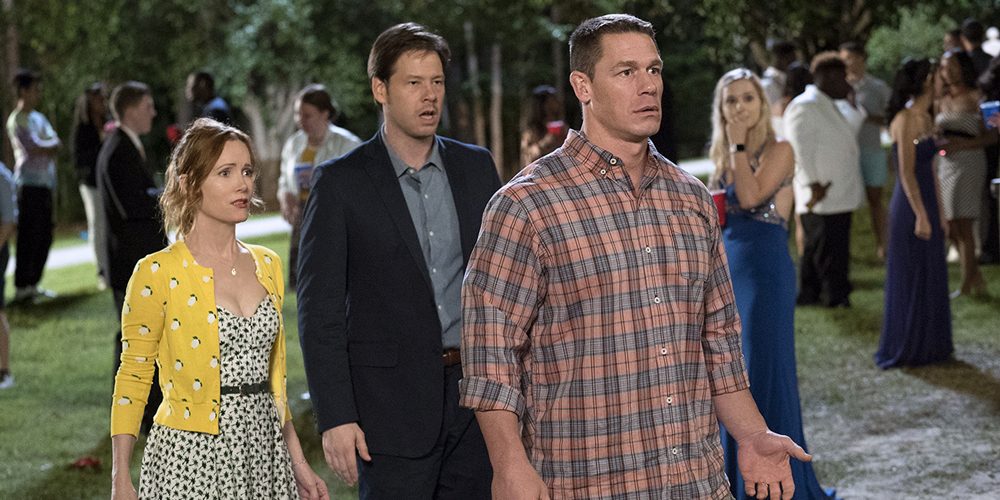I was happy to see that the focus was on a group of empowered young women who knew what they wanted and wouldn’t take no for an answer. It was also nice to see them call audibles throughout the film as their feelings changed. A great deal of the plot revolves around the sex pact. They spend some time hemming and hawing over whether or not they are ready or if it feels right, which I thought was a nice alternative to the male-dominated teen sex comedies of the 1990s where no one ever stopped to ask those questions and the focus was on how to get it done rather than asking if it should be done at all. I have to add a caveat here, however, which is that while I appreciate the portrayal of the teens as smart, self-possessed and confident, that doesn’t mean all their actual choices are good choices. The copious drinking and drug use, while portrayed as consequence free and completely without second thought, are in fact incredibly stupid choices that don’t bode well for them in college.
The acting in the film is just fine. No one is really a stand out, though I thought Leslie Mann was particularly funny among the adult characters as an anxious, uptight single mom, and John Cena, a hulking cargo-short wearing, suburbanite, sports-obsessed father was particularly flat. His comedic chops are derived more from the juxtaposition of who he is against the situations the plot puts him in rather than his ability to sell any particular scene, unlike Dwayne Johnson, who might have a similar background and build, but has a lot more charisma and acting chops. The younger actors all did a fine job, though I thought Geraldine Viswanathan, who played Cena’s bold, outgoing, sporty daughter was the most charismatic of the bunch, and Miles Robbins, the young man paired with her as her prom date and craft drug baker and dealer was also a stand out among an otherwise bland cast of young men.
It’s hard to watch this and not think about how films of the past have portrayed teens going through these struggles. In the 1980s, it was all John Hughes movies about clique clashes in high school with its highly regimented social order full of socially awkward teens who didn’t even know how to talk to each other, let alone openly explore their sexuality in a confident way. 1990s teen movies took on a more rom-com appeal, with still awkward meet cutes and bold romantic gestures usually featuring a central pair that needed to get together. Blockers highlights how difficult it is for parents to adjust to this new reality, and how our conventions and understanding of the troublesome transitional period between childhood and adulthood have changed over the last 30 years. The teens of The Breakfast Club wouldn’t even recognize the world Blockers takes place in. Anyone interested in following that line of thought would be interested to read Molly Ringwald’s recent New Yorker piece where she looks back on the significance of those John Hughes movies and the role they played in changing how Hollywood depicts teenagers. In it, she touches on how teens of the Baby Boomer era changed into the infantilized, disrespected teens of the 1980s. You can also follow that thread to see how Millennial and Post-Millennial teens have changed since then. Blockers is an infantile movie, but the connective tissue follows right out of those John Hughes movies.
My biggest problem with the film, other than the unnecessary gross out moments that the film just couldn’t help itself to avoid (no one needs to see Cena engage in “butt chugging”), was how much it exemplifies the decade-or-more long trend of showing the normative film subject being casually and vaguely wealthy. The families of this story live in huge houses in some rich Chicagoland suburb. They casually produce and consume expensive drugs, go to huge parties at friends’ lake houses, attend a lavish prom, and other signs of conspicuous wealth that are never addressed, but carry with them the assumption that this is normal, and that this is what you, the viewer, should compare yourself too. I had the same feeling when watching I Love You, Simon, a film that I really liked, but was also turned off by the fact that wealth was again the de facto state. It’s something that has also changed since the 1980s, when the norm was more humble and middle class. What is it about lower and middle class living that directors find unfilmable?
I get that small houses don’t make for the easiest scenes to shoot, but that’s a poor excuse for making every family depicted on screen abnormally wealthy. Do teens whose parents make less than the median national income just not lead interesting lives? Or is it that poverty and more modest living are too big a distraction from films dedicated to sex and sexuality? I’m not sure, but I do know that I had an easier time when I was a teen identifying with teens whose problems were trying to figure out how to pay for college instead of choosing from what expensive college to attend that their parents could easily afford, or how I would afford my share of the prom night limo rather than making sure I’d booked my gazillion dollar luxury suite in a hotel where every other student at the school also booked a room for an insanely expensive after party that must have cost more than the prom itself. Can’t one of these kids at least have an after-school job? It’s great that we’re finally coming close to gender, racial and sexual orientation parity in films. The next big mountain to climb is economic status parity. Not everyone in America is in the top 10%. Can we please see some films with normal people?
If you have nothing else to do and there’s a weekend matinee on, the film is perfectly fine, and amusing. Anyone who liked either of the Neighbors movies would likely find this an excellent entrant into that vein of comedies. There is surprising depth in how it handles its young people, and the anxieties of today’s parents are on full display in a way that many adults will find at once comforting and terrifying.








